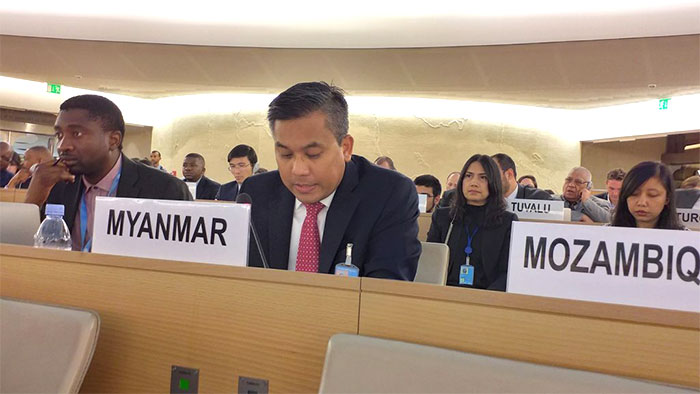Date: September 28, 2019

Permanent Representative of Myanmar U Kyaw Moe Tun. Photo: MNA
Myanmar categorically rejected the draft resolution on “Situation of Human Rights of Rohingya Muslims and other minorities in Myanmar” tabled by the European Union (EU) and the Organization of Islamic Cooperation (OIC) on 26 September 2019 at the 42nd Regular Session of the United Nations Human Rights Council in Geneva.
Permanent Representative of Myanmar U Kyaw Moe Tun delivered a statement, before taking action on the draft resolution. He highlighted the following main reasons, among others, why the draft resolution was not accepted by Myanmar:
1. As a matter of principle, Myanmar opposes any country-specific resolution.
The whole exercise of this is politically driven attempt to exert undue pressure on a selected country.
2. The draft resolution aims to legitimize unjust convictions of Ms Yanghee Lee and fabricated and narrative-based reports of FFM. Both Ms Yanghee Lee and FFM cast negative light on every effort of Myanmar government as well as of private sector and humanitarian enterprises.
3. Furthermore, some Operative Paragraphs are one-sided and drive for repeated and duplicated actions on Myanmar, which are under active consideration of the UN Human Rights Council, with the aim to garner unprecedented scrutiny and international pressure.
4. The draft resolution comprises a number of factually flawed paragraphs based on sweeping allegations and false assumption. One example, among others, is the issue of freedom of religion. In Myanmar, freedom of religion and belief is legally guaranteed and protected.
5. In addition, although the title includes other minorities, the primary focus of the resolution is on the rights of one community in Rakhine. The voice of one community is heard at the Council. Others’ voices which cannot reach out to this Council must be listened to. Last week, Hindu people in Myanmar held the 2nd Anniversary of Praying Ceremony for more than a hundred of Hindu people massacred by ARSA terrorists. They expressed concern about their relatives and friends, who are desperately stuck in the camps in Cox’s Bazar. All must not be silent to their plight and their request for return.
6. On top of these, tone and tenor of the draft resolution completely disregard for sovereignty of Myanmar. The issue of citizenship, for example, is entirely the prerogative of a sovereign state. Like in every country, no one can get automatic citizenship in Myanmar, without going through a process. The national verification procedure is applied in all parts of Myanmar.
7. Myanmar is fully aware of the differences between genuine concern for human rights and political drives. Thus, it strongly rejects intrusive paragraphs on accountability issue. Myanmar is willing, capable of, and addressing the issue of accountability with domestic accountability mechanisms.
The Permanent Representative emphasized the need to adhere to the purposes and principles of the UN Charter and that any mechanism including the HRC should not be abused “for pursuing their own interest and political agenda.”
“Myanmar shall not be bound by this unfair and highly politicized resolution” he stressed.
While calling for constructive approach, productive cooperation and practical support based on genuine goodwill for durable impact on the ground, hestated, “Such ill-intentioned, politically driven resolution would not contribute to any positive change and development in Myanmar.”
“Coercive retributive measures and undue political pressure imposed on Myanmar would only serve to inflame the discourse and detract from essential pursuit of democracy and human rights”, he further stated.
The Permanent Representative concluded by appealing to the member states of the Council to stand firm with Myanmar on principle and to support the people of Myanmar by voting against the draft resolution.
The delegation of China called for a vote and casted a negative vote in support of Myanmar, explaining positive progress in Myanmar’s efforts including repatriation. China pointed out that the adoption of that resolution would not be conducive to address the issue in Myanmar as it did not reflect the view of the country concerned.
The delegation of the Philippines voted against the resolution in support of Myanmar and pointed out the proliferation of mandates on Myanmar, using a huge amount of money, without making concrete progress on the ground. The delegation of Japan abstained and expressed its disappointment on not getting enough time to study the draft resolution and stressed the need to ensure transparency and that none of its recommendations were reflected in the draft resolution.
The draft resolution of the EU and the OIC was put to a vote at the 47-member Human Rights Council, and adopted with a vote of 2 against, 7 abstentions and 37 in favour. China and the Philippines voted against the resolution in support of Myanmar.
The other 7 countries – Angola, Cameroon, Democratic Republic of the Congo, India, Japan, Nepal and Ukraine – did not support the resolution and abstained in the voting. Cuba did not participate in the voting – MNA
Useful Websites
Government Websites
UNITED NATIONS WEBSITES
- http://www.un.org
- https://unog.ch/
Quick Links
- President Office
- State Counsellor Office
- Ministry of foreign Affairs
- Ministry of Immigration and Population
- Ministry of Hotels and Tourism
UMFCCI - Travel Information
